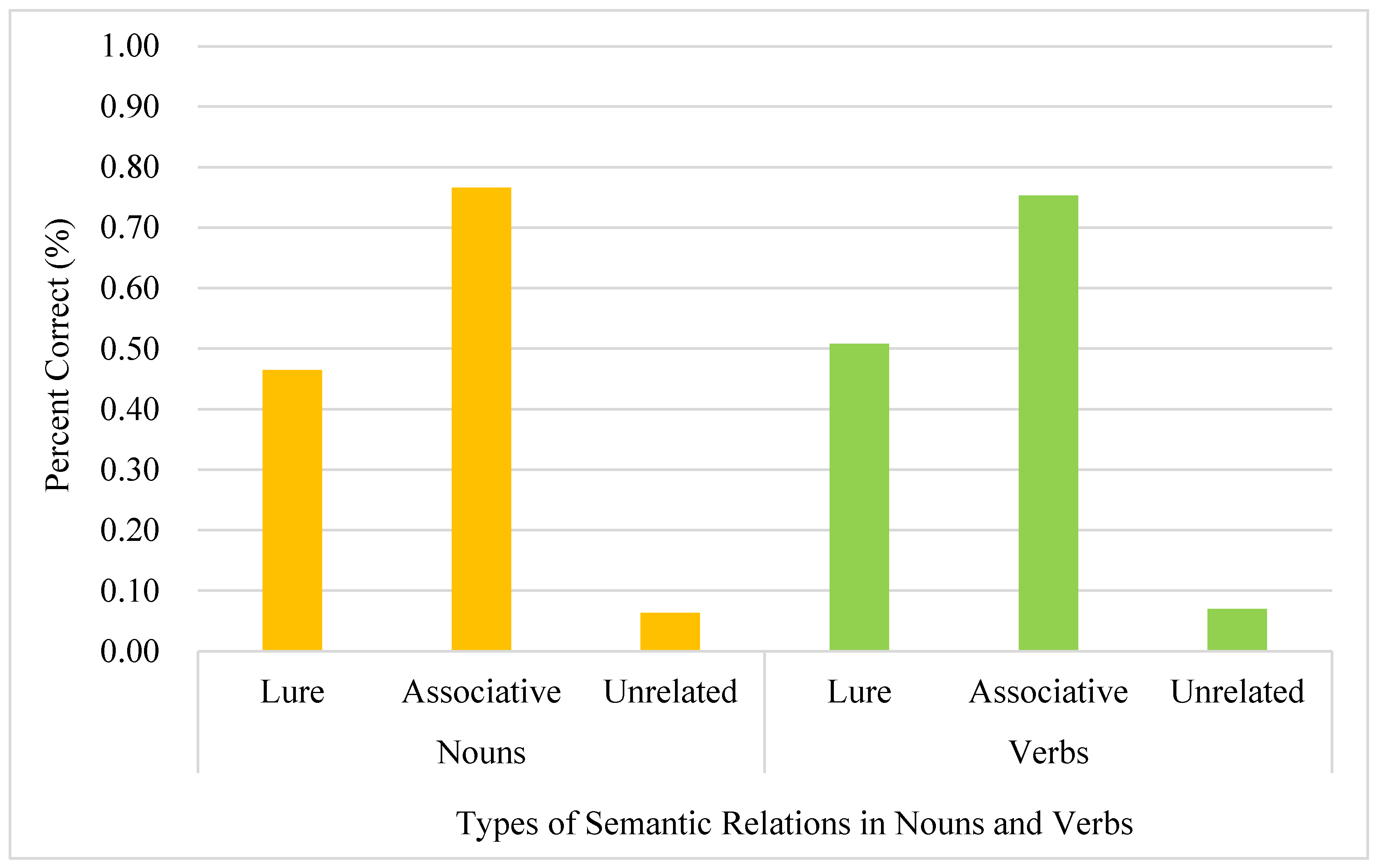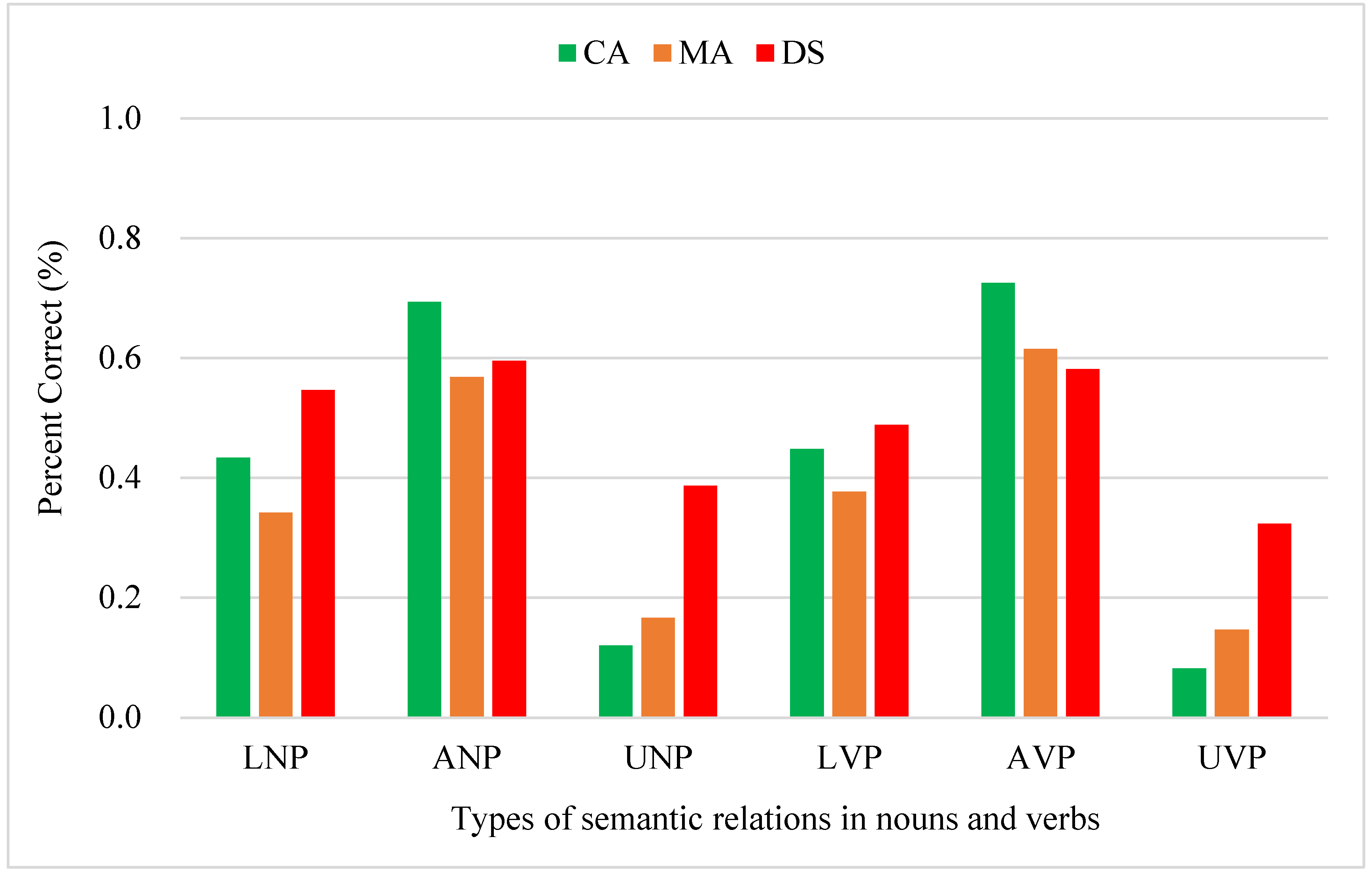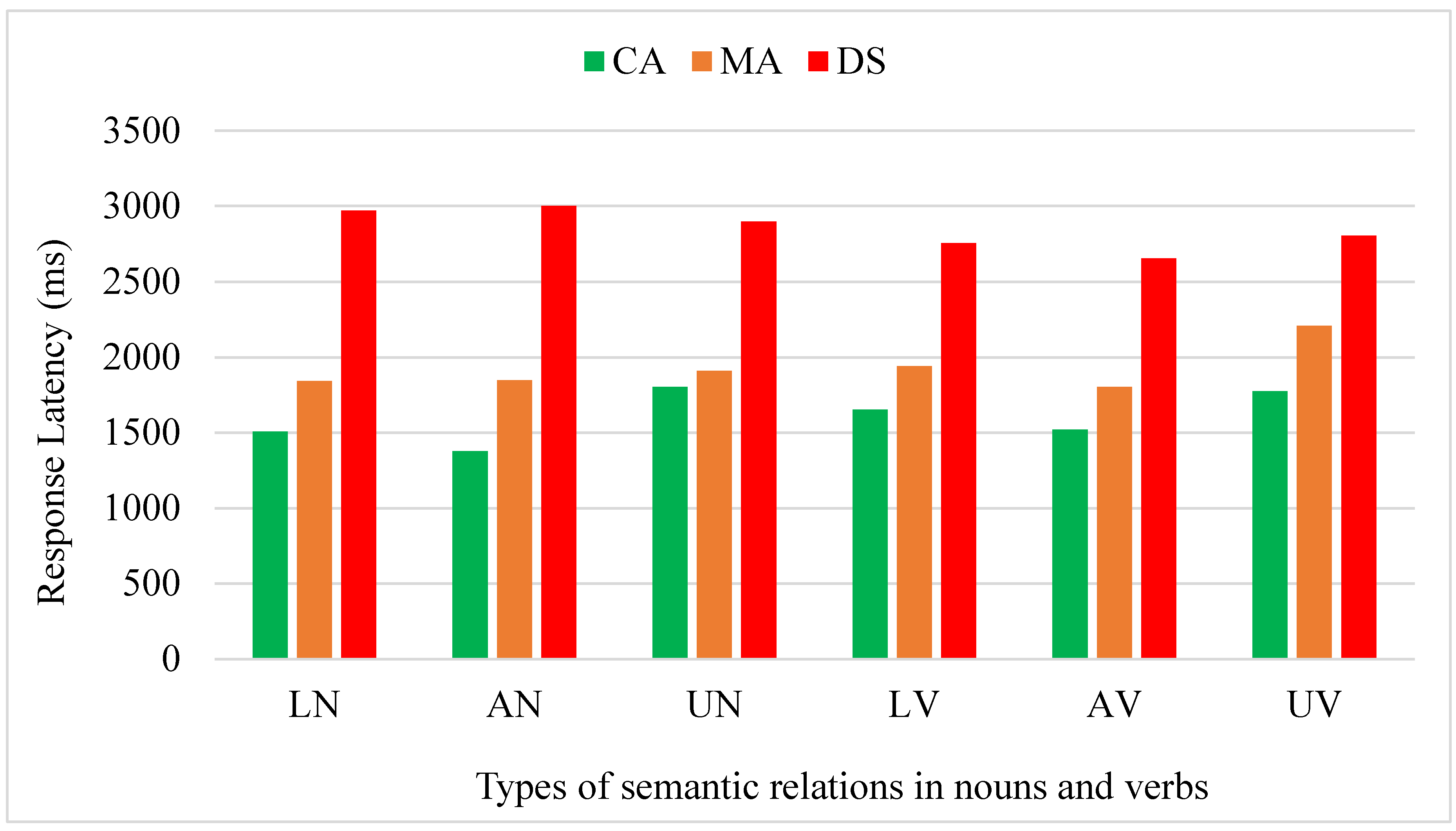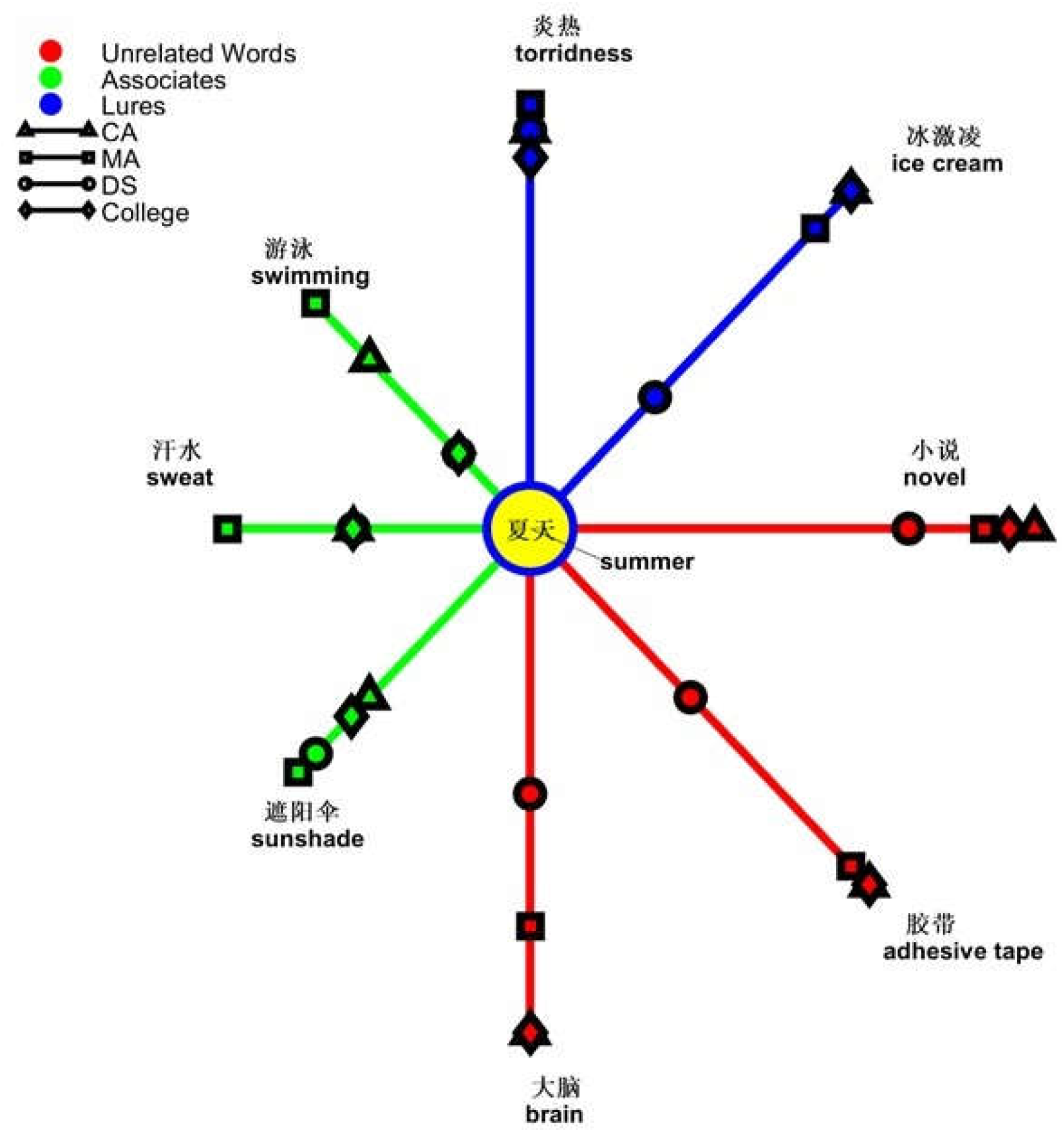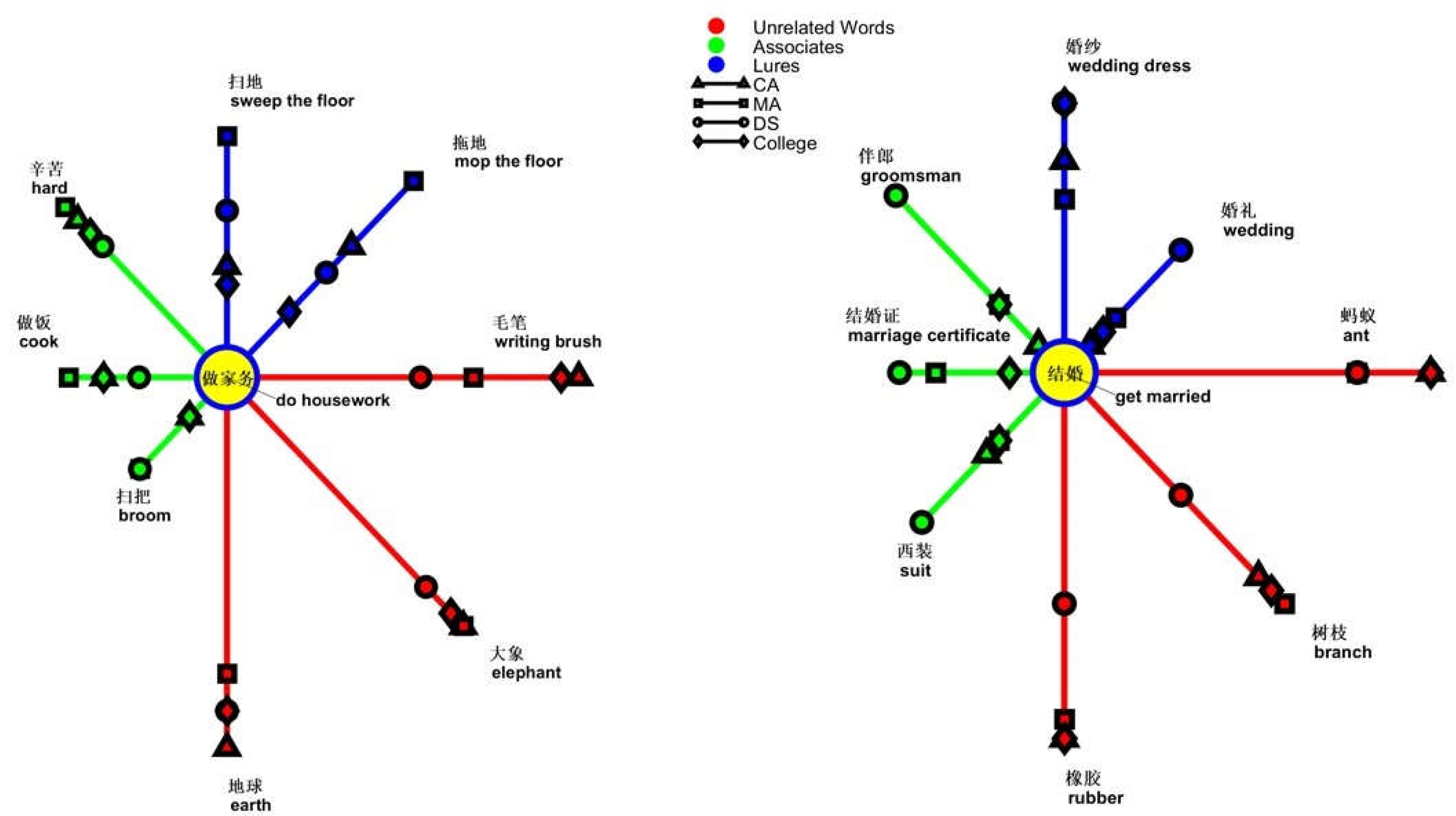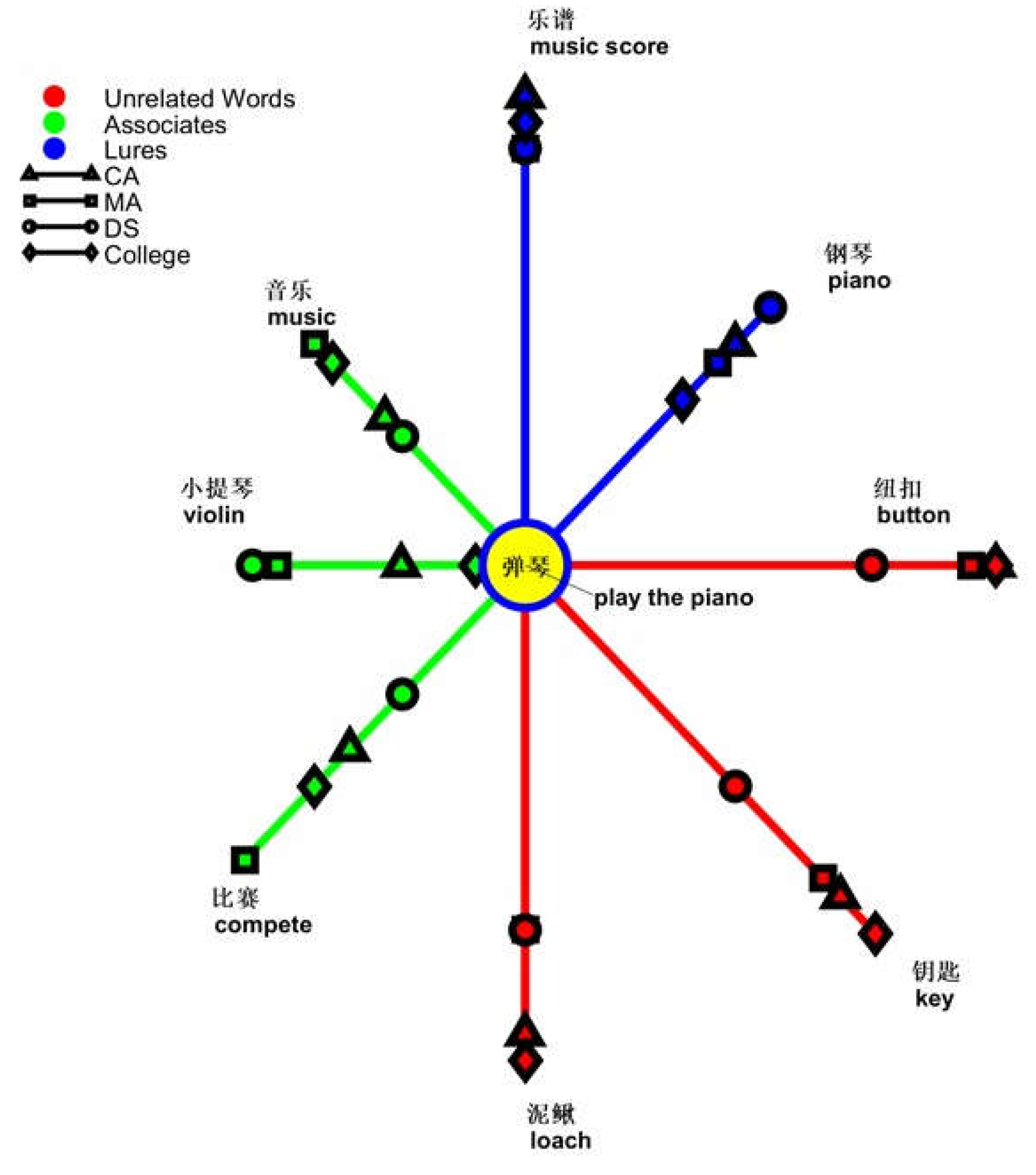3.2. Data Analyses of People with Down Syndrome and Typically Developing Controls
Three-way ANOVA repeated ANOVAs with yes responses in types of words as within-participants factors and groups as between-participants factors were included in the analyses. No three-way interactions were observed (F < 1). Two-way interaction between types of words and groups reached significance [F(4,114) = 12.06, p < 0.001, ƞ2 = 0.29]. One of the simple main effects was from the difference among groups in each type of words, suggesting group difference in lures [DS, 0.518, SE = 0.040; CA, 0.441, SE = 0.040; MA, 0.359, SE = 0.040; F(2,57) = 3.96, p = 0.025, ƞ2 = 0.122], group difference in associates [CA, 0.709, SE = 0.031; MA, 0.592, SE = 0.031; DS, 0.588, SE = 0.031; F(2,57) = 4.931, p = 0.011, ƞ2 = 0.147], and group difference in unrelated words [DS, 0.355, SE = 0.032; MA, 0.157, SE = 0.032; CA, 0.101, SE = 0.032; F(2,57) = 17.270, p < 0.001, ƞ2 = 0.377]. The difference in lures was due to the difference between the DS and MA (p = 0.007). The difference in associations was due to the difference between DS and CA (p = 0.008) and the difference between MA and CA (p = 0.01). The difference in unrelated words was due to the difference between DS and CA (p < 0.001) and DS and MA (p < 0.001). Another simple main effect was the difference in the types of words used in each group. In the CA group, associates (0.709, SD = 0.157) were responded more accurately than lures (0.440, SD = 0.153) and unrelated words (0.100, SD = 0.196) at p < 0.001 [F(2,38) = 91.743, p < 0.001, ƞ2 = 0.828]. The latter two types of words differed significantly (p < 0.001). In the MA group, associates (0.591, SD = 0.123) were responded more accurately than lures (0.359, SD = 0.131) and unrelated words (0.156, SD = 0.132) at p < 0.001 [F(2,38) = 77.022, p < 0.001, ƞ2 = 0.802]. The latter two types of words differed significantly (p < 0.001). In the DS group, associates (0.588, SD = 0.132) were responded more accurately than lures (0.517, SD = 0.232) and unrelated words (0.355, SD = 0.187) at p < 0.001 [F(2,38) = 22.058, p < 0.001, ƞ2 = 0.537]. The latter two types of words differed significantly (p < 0.001). The difference between associates and lures was not significant.
Two-way interaction of syntactic categories and types of words reached significance [F(2,114) = 4.718, p = 0.011, ƞ2 = 0.076]. The simple main effect was from difference among types of nouns [F(2,118) = 97.864, p < 0.001, ƞ2 = 0.624] and verbs [F(2,118) = 131.211, p < 0.001, ƞ2 = 0.690]. For nouns, associates (0.619, SE= 0.021) received higher responses than lures (0.441, SE = 0.027) or unrelated words (0.224, SE = 0.025) [all p < 0.001]. For verbs, associated words (0.641, SE = 0.022) received higher responses than lures (0.438, SE = 0.024) or unrelated words (0.184, SE = 0.024) [all p < 0.001]. No differences in the syntactic categories of the word types emerged.
The main effect of types of words reached significance [
F(2,114) = 179.553,
p < 0.001,
ƞ2 = 0.759], suggesting associates received higher yes responses (0.630, SE = 0.018) than lures (0.439, SE = 0.023) and unrelated words (0.204, SE = 0.019) at
p < 0.001. Unrelated words received the least number of responses. The main effect of groups was significant [
F(2,57) = 5.114,
p = 0.009,
ƞ2 = 0.152], implying that the DS group pressed highest frequency of yes responses (0.487, SE = 0.026) compared to the CA group (0.417, SE = 0.026) and the MA group (0.369, SE = 0.026). Only the difference between the DS group and MA group was significant (
p = 0.002). The response accuracies of the types of nouns and verbs in the three groups are shown in
Figure 3.
In sum, people with DS had developmental delays in responding to associates as well as developmental deviance in processing lures and unrelated words.
In the analyses of reaction times, the data of one participant were removed because their reaction times were too long to respond to almost all trials. Other data were counted as missing in the analyses because of 100 percent correct responses to unrelated words (14% nouns and 17% verbs). The analyses with syntactic categories and types of words as within-participants factors and groups as between-participants factors revealed no differences in the three- and two-way interactions. The main effect of the types of words was significant [
F(2,82) = 4.500,
p < 0.014,
ƞ2 = 0.099], suggesting longest responses were observed with the unrelated words (2233 ms, SE = 161) compared to the lures (2112 ms, SE = 158) [
p = .030] and the associates (2034 ms, SE = 147) [
p = 0.026]. The latter two values were not statistically significant. The main effect of groups was significant [
F(2,46) = 7.117,
p = 0.002,
ƞ2 = 0.236]. People with DS (2956 ms, SE = 268 ms) were slowest in responding to all trials compared to the two controls (CA, 1588 ms, SE = 277 ms,
p = 0.001; MA, 1857 ms, SE = 277 ms,
p = 0.007). No significant differences were observed between the CA and MA groups. The reaction times for the types of nouns and verbs in the three groups are shown in
Figure 4.
3.4. Analyses of Error Patterns in Noun-Eliciting False Memory Task
To determine which semantic concepts of nouns were more fragile in people with DS compared to controls, the error patterns of the topics in each group were analyzed. The nominal topics and types of words were taken as the within-participants factors, and groups as the between-participants factor in a three-way analysis of variance. The results revealed significant three-way interaction [F(36,1026) = 1.571, p = 0.018, ƞ2 = 0.052]. One of the simple main effects was from the two-way interaction of topics and groups to lures [F(18,513) = 2.273, p = 0.002, ƞ2 = 0.074]. The simple simple main effect was from group effect on topics of “public square dancing” [DS, 0.500, SD = 0.296; MA, 0.133, SD = 0.199; CA, 0.116, SD = 0.163; F(2,57) = 18.279, p < 0.001, ƞ2 = 0.391], “amusement park” [DS, 0.516, SD = 0.314; MA, 0.266, SD = 0.231; CA, 0.283, SD = 0.311; F(2,57) = 4.694, p = 0.013, ƞ2 = 0.141], and “summer” [DS, 0.433, SD = 0.326; MA, 0.250, SD = 0.238; CA, 0.216, SD = 0.291; F(2,57) = 3.286, p = 0.045, ƞ2 = 0.103]. With respect to these topics, people with DS made more errors than the two control groups with least significance difference among post-hoc analyses at p < 0.001 on the top of “public square dancing” to both CA group and MA group at p = 0.013 (DS vs. CA) and p = 0.008 (DS vs. MA) on the topic of “amusement park,” and at p = 0.021 (DS vs. CA) and p = 0.049 (DS vs. MA) on the topic of “summer.” Other group effect was observed on the topics of “breakfast store” [DS, 0.650, SD = 0.366; MA, 0.300, SD = 0.303; CA, 0.500, SD = 0.315; F(2,57) = 5.674, p = 0.006, ƞ2 = 0.166] and “road” [DS, 0.616, SD = 0.363; MA, 0.300, SD = 0.303; CA, 0.483, SD = 0.295; F(2,57) = 4.866, p = 0.011, ƞ2 = 0.146], suggesting higher errors of people with DS than the controls in MA to the topics of “breakfast store” and “road.” On these topics, people with DS made more errors than the MA control groups with least significance difference post-hoc analyses on the topic of “breakfast store” (p = 0.001) and on the topic of “road” (p = 0.003).
Another simple simple main effect was from topic effect on groups [CA, F(9,171) = 9.735, p < 0.001, ƞ2 = 0.339; MA, F(9,171) = 7.431, p < 0.001, ƞ2 = 0.281; DS, F(9,171) = 2.145, p = 0.028, ƞ2 = 0.101]. All the groups erred highest to the topic of “hospital” (CA, 0.700, SE = 0.064; MA, 0.733, SE = 0.052; DS, 0.667, SE = 0.084); however, the patterns of lowest errors were different in people with DS from the two healthy control groups. The CA group and the MA group erred least to “public square dancing” (CA, 0.117, SE = 0.036; MA, 0.133, SE = 0.045); the DS group erred least to “barber shop” (0.433, SE = 0.091) and to “summer” (0.433, SE = 0.073). The main effect of the group reached significance [F(2,57) = 5.558, p = 0.006, ƞ2 = 0.163], suggesting the DS group erred most (0.547, SE = 0.044) than the CA group (0.433, SE = 0.044) and the MA group (0.342, SE = 0.044). The difference between the DS group and MA group was statistically significant (p = 0.002).
The interactions between topics and groups in the processing of associated and unrelated words were not significant. The main effect of groups in processing associates was significant [F(2,57) = 3.631, p = 0.033, ƞ2 = 0.113], suggesting the CA group erred least (0.307, SE = 0.035) than the MA group (0.432, SE = 0.035, p = 0.013) and the DS group (0.405, SE = 0.035, p = 0.049). The lowest errors was observed to “hospital” (0.217, SE = 0.039) and the highest errors was to “summer” (0.472, SE = 0.038). Moreover, the main effect of the group in processing the unrelated words was significant [F(2,57) = 16.733, p < 0.001, ƞ2 = 0.370], suggesting the DS group erred most (0.387, SE = 0.035) than the CA group (0.120, SE = 0.035) and the MA group (0.167, SE = 0.035) at p < 0.001. In sum, people with DS made errors in association as the MA controls (i.e., delay), but they made errors in unrelated words the most (i.e., deviance). The error patterns of people with DS differed from those of the two control groups.
Another simple main effect was the two-way interaction between the type and group for each topic. The results showed the topics of “the Dragon Boat Festival,” “public square dancing,” “bathroom,” “road,” and “summer” reached significance.
Table 2 presents the statistical results.
In the topic of “the Dragon Boat Festival,” the simple main effect was from group effect on associates [
F(2,57) = 3.485,
p = 0.037,
ƞ2 = 0.109]. The DS group (0.533, SD = 0.199) erred in the MA group (0.500, SD = 0.253,
p = 0.017) which, in turn, was greater than that in the CA group (0.333, SD = 0.305,
p = 0.045). No significant differences were observed between the two groups, and no differences were observed between the groups for lures or unrelated words. The other simple main effect was from types of words on groups [CA,
F(2,38) = 7.858,
p = 0.001,
ƞ2 = 0.293; MA,
F(2,38) = 8.703,
p = 0.001,
ƞ2 = 0.314; DS,
F(2,38) = 10.916,
p < 0.001,
ƞ2 = 0.365]. People with DS responded less to unrelated words (0.217, SE = 0.065) than to lures (0.517, SE = 0.074) and associates (0.533, SE = 0.045) at
p = 0.001. The patterns observed in the CA group were similar to those in people with DS (unrelated words, 0.117, SE = 0.050; associates, 0.333, SE = 0.068; lures, 0.517, SE = 0.085). The difference between unrelated words and lures was significant (
p = 0.001), as was the difference between unrelated words and associates (
p = 0.008). However, the MA group had more associated words (0.500, SE = 0.057) than lures (0.300, SE = 0.072) and unrelated words (0.150, SE = 0.051). The difference between associates and lures was
p = 0.019 and the difference between associates and unrelated words was
p < 0.001. The results revealed different patterns in the MA group compared to those in the CA and DS groups. A graph showing yes responses as the semantic distance between the topic of “the Dragon Boat Festival” and the types of words is shown in
Figure 5. To display the complete picture of semantic relatedness among all groups, the results for college students are included in the graph for comparison.
In the topic of “public square dancing,” interaction of types of words and groups reached significance [
F(4,114) = 6.755,
p < 0.001,
ƞ2 = 0.192]. The simple main effect was from group effect on lures [
F(2,57) = 5.674,
p = 0.006,
ƞ2 = 0.116] and unrelated words [
F(2,57) = 3.572,
p = 0.035,
ƞ2 = 0.111]. People with DS made more errors (0.650, SE = 0.074) in lures than did the CA (0.500, SE = 0.074) and MA groups (0.300, SE = 0.074). Only the difference of people with DS and MA group was significant (
p = 0.001). People with DS (0.450, SE = 0.066) erred more than the two control groups (0.233, SE = 0.066) for unrelated words, suggesting deviant processing in people with DS. Another main effect was from effect of types of words in control groups [CA,
F(2,38) = 4.815,
p = 0.014,
ƞ2 = 0.202; MA,
F(2,38) = 19.046,
p < 0.001,
ƞ2 = 0.501; DS,
F < 1]. In the CA group and MA group, associates erred significantly more than lures (CA,
p = 0.012; MA,
p < 0.001) and unrelated words (CA,
p = 0.049; MA,
p = 0.001)[CA, associates, 0.300, SD = 0.239; lures, 0.116, SD = 0.163; unrelated words, 0.183, SD = 0.253; MA, associates, 0.650, SD = 0.275; lures, 0.133, SD = 0.199; unrelated words, 0.216, SD = 0.311]. However, people with DS did not observe in pattern. Instead, people with DS erred more toward lures (0.500, SE = 0.066) than toward associates (0.400, SE = 0.071) or unrelated words (0.383, SE = 0.070). No significant differences were observed between the word types. This finding suggests that people with DS were deviant in making the highest proportion of yes responses to unrelated words and showed a distinct pattern of higher errors in lures than the control groups. A graph showing yes responses as the semantic distance between the topic of “public square dancing” and the types of words is shown in
Figure 5.
In the topic of “bathroom,” interaction of types of words and groups reached significance [
F(4,114) = 2.731,
p = 0.032,
ƞ2 = 0.087]. The simple main effect was from group effect on unrelated words [
F(2,57) = 7.320,
p = 0.001,
ƞ2 = 0.204], suggesting people with DS made more errors than the CA group (
p < 0.001) and the MA group (
p = 0.017). Another simple main effect was from types of words in groups [CA,
F(2,38) = 23.413,
p < 0.001,
ƞ2 = 0.552; MA,
F(2,38) = 3.973,
p = 0.027,
ƞ2 = 0.173]. However, this difference was not significant in the DS group. In the CA and MA groups, lures erred more often than associates or unrelated words (CA, lures, 0.600, SD = 0.255; associates, 0.333, SD = 0.305; unrelated words, 0.050, SD = 0.122; MA, lures, 0.416, SD = 0.322; associates, 0.400, SD = 0.298; unrelated words, 0.166, SD = 0.315). The CA group showed a difference between unrelated words and lures at
p < 0.001 and a difference between unrelated words and associates at
p = 0.001. The difference between lures and associates was
p = 0.012. The MA group showed a difference between unrelated words and lures at
p = 0.010 and a difference between unrelated words and associates at
p = 0.019. Lures and their associates were not statistically significant. The graph showing yes responses as semantic distance between “bathroom” and types of words is depicted in
Figure 6.
In the topic of “road,” interaction of types of words and groups was significant [
F(4,114) = 2.721,
p = 0.033,
ƞ2 = 0.087]. The simple main effect was from group effect on lures [
F(2,57) = 4.866,
p = 0.011,
ƞ2 = 0.146] and unrelated words [
F(2,57) = 10.756,
p < 0.001,
ƞ2 = 0.274]. People with DS made more errors in lures than those in the MA group (
p = 0.003). People with DS erred more unrelated words than those in the MA group and CA group, both at
p < 0.001. Another simple main effect was from effect of types of words in the CA group [
F(2,38) = 8.412,
p = 0.001,
ƞ2 = 0.307] and in the DS group [
F(2,38) = 5.159,
p = 0.010,
ƞ2 = 0.214]. In the CA group, lures (0.483, SD = 0.295) erred more frequently than associates (0.216, SD = 0.223,
p = 0.014) and unrelated words (0.166, SD = 0.299,
p = 0.001). In the DS group, lures (0.616, SD = 0.363) erred more than unrelated words (0.516, SD = 0.350) or associates (0.316, SD = 0.275), both at
p = 0.012. The graph showing yes responses as semantic distance between “road” and types of words is depicted in
Figure 6.
In the topic of “summer,” interaction of types of words and groups was significant [
F(4,114) = 5.919,
p < 0.001,
ƞ2 = 0.172]. The simple main effect was from group effect on types of words [lures,
F(2,57) = 3.286,
p = 0.045,
ƞ2 = 0.103; associates,
F(2,57) = 3.643,
p = 0.032,
ƞ2 = 0.113; unrelated words,
F(2,57) = 17.401,
p < 0.001,
ƞ2 = 0.379]. Regarding the error patterns of lures and unrelated words, the DS group made more errors than the CA and MA groups (DS, lures, 0.433, SE = 0.064; CA, 0.217, SE = 0.064; MA, 0.250, SE = 0.064; unrelated words, DS, 0.433, SE = 0.049; CA, 0.033, SE = 0.049; MA, 0.150, SE = 0.049). For lures, the difference between the DS group vs. the MA group was
p = 0.049 and the difference between the DS group and CA group was at
p = 0.021. In unrelated words, the difference between the DS group and two control groups was
p < 0.001. However, in the error pattern of associates, the MA group (0.617, SE = 0.066) erred the most compared to the CA group (0.417, SE = 0.066,
p = 0.037) and DS group (0.383, SE = 0.066,
p = 0.015). Another simple main effect was from effect of types of words in the CA group [
F(2,38) = 12.938,
p < 0.001,
ƞ2 = 0.405] and the MA group [
F(2,38) = 15.721,
p < 0.001,
ƞ2 = 0.453]. Both the CA and MA groups erred more to associates (CA: 0.417, SE = 0.063; MA: 0.617, SE = 0.078) than to lures (CA: 0.217, SE = 0.065; MA: 0.250, SE = 0.053) or unrelated words (CA: 0.033, SE = 0.023; MA: 0.150, SE = 0.045). No significant differences were observed between the two groups. Taken together, these results suggest that people with DS show deviations in processing summer-related semantic words. The graph showing yes responses as semantic distance between the topic of “summer” and types of words is depicted in
Figure 7.
No interaction was observed between processing “barber shops” and “breakfast stores,” “amusement park,” “Christmas,” and “hospital.” People with DS erred the most compared with the CA and MA controls. Significant differences among the groups were observed in processing “barber shops,” “breakfast stores,” “public square dancing,” “amusement parks,” “bathrooms,” “roads,” and “summer.” The effects of word type in each group differed for each topic. In the CA group, all the effects of the types of words were significant (except for the topic of “amusement park”). In the MA group, almost all effects of the types of words were significant (except for “breakfast store,” “amusement park,” and “road”). In the DS group, almost all the effects of types of words were not significant (except for “the Dragon Boat Festival,” “road,” and “hospital”). These findings suggest that people with DS deviate from forming concepts through lexical semantics.
3.5. Analyses of Error Patterns in Verb-Eliciting False Memory Task
To determine which semantic concepts of verbs were more fragile in people with DS compared to controls, the error patterns of topics in each group were analyzed. Verbal topics and types of words were taken as the within-participants factors and groups as the between-participants factor in a three-way analysis of variance. The results revealed significant three-way interaction [F(36,1026) = 2.083, p < 0.001, ƞ2 = 0.068]. One of the simple main effects was from the two-way interaction of topics and groups in processing lures [F(18,513) = 2.566, p < 0.001, ƞ2 = 0.083]. The simple simple main effect was from group effect on “do housework” [F(2,57) = 3.243, p = 0.046, ƞ2 = 0.102], “transport during Spring Festival” [F(2,57) = 3.917, p = 0.025, ƞ2 = 0.121], “get married” [F(2,57) = 3.966, p = 0.024, ƞ2 = 0.122], and “shop online.” In processing of the former two topics and the last one, the DS group erred more than the two control groups [“do housework,” DS, 0.583, SD = 0.402; CA, 0.533, SD = 0.380; MA, 0.300, SD = 0.340; “transport during Spring Festival,” DS, 0.466, SD = 0.294; CA, 0.283, SD = 0.311; MA, 0.216, SD = 0.270; “shop online,” DS, 0.650, SD = 0.350; CA, 0.500, SD = 0.275; MA, 0.350, SD = 0.253]. Only the differences between the DS group and MA group were significant (“do housework,” p = 0.020; “transport during the Spring Festival,” p = 0.009; “shop online,” p = 0.002). When processing “get married,” the DS group (0.466, SD = 0.313) produced fewer yes responses than the two control groups (0.716, SD = 0.329). The differences between the DS group and the two controls were significant (p = 0.018).
Another simple simple main effect was from the effect of types of words in groups [CA, F(9,171) = 5.018, p < 0.001, ƞ2 = 0.209; MA, F(9,171) = 5.373, p < 0.001, ƞ2 = 0.220; DS, F(9,171) = 2.996, p = 0.002, ƞ2 = 0.136]. The error patterns differed between the DS and control groups. In the two control groups, both groups erred most to “get married” (0.716, SD = 0.329) and least to “celebrate birthday” (CA, 0.250, SD = 0.283; MA, 0.216, SD = 0.270) and “transport during Spring Festival” (CA, 0.283, SD = 0.311; MA, 0.216, SD = 0.270). However, people with DS erred most to “shop online” (0.650, SD = 0.350) and least to “celebrate birthday” (0.400, SD = 0.368) and “play piano” (0.283, SD = 0.369).
Another simple main effect was from the effect of types of words in processing associates [F(18,513) = 2.003, p = 0.008, ƞ2 = 0.066]. The simple simple main effect was from group effect on “get married” [F(2,57) = 10.121, p < 0.001, ƞ2 = 0.262], “celebrate New Year” [F(2,57) = 5.894, p = 0.005, ƞ2 = 0.171], and “play piano” [F(2,57) = 4.101, p = 0.022, ƞ2 = 0.126]. In processing of the former two topics, people with DS erred most among groups [“get married,” DS, 0.550, SD = 0.329; MA, 0.283, SD = 0.291; CA, 0.150, SD = 0.228; “celebrate New Year,” DS, 0.366, SD = 0.284; MA, 0.250, SD = 0.303; CA, 0.083, SD = 0.183]. In the process of “playing piano,” people with DS (0.416, SD = 0.322) made errors similar to those in the CA group (0.383, SD = 0.311), which were fewer than those in the MA group (0.633, SD = 0.262). Another simple simple main effect was from the effect of topics in groups [CA, F(9,171) = 4.400, p < 0.001, ƞ2 = 0.188; MA, F(9.171) = 4.812, p < 0.001, ƞ2 = 0.202]. No significant differences were observed between the DS and DS groups. Moreover, the error patterns differed between the CA and MA groups. In the CA group, the errors to “transport during Spring Festival” were the highest (0.400, SD = 0.352) and the errors to “celebrate the New Year” (0.083, SD = 0.183) and “get married” (0.150, SD = 0.228). In the MA group, the errors to “play piano” were the highest (0.633, SD = 0.262) and the errors to “celebrate New Year” (0.250, SD = 0.303) and “watch movies” (0.250, SD = 0.262). The interaction between topics and groups in processing unrelated words was not significant. People with DS erred most among groups to the unrelated words [main effect of group, F(2,57) = 13.132, p < 0.001, ƞ2 = 0.315; DS, 0.323, SE = 0.035; MA, 0.147, SE = 0.035; CA, 0.082, SE = 0.035].
In sum, people with DS were deviant in responding to lures of the verb-eliciting topics of “do housework,” “transport during Spring Festival,” “get married,” and “shop online.” Peoples with DS showed deviant error patterns in processing lures that differed from the control groups. People with DS were deviant in responding to associates of the verb-eliciting topics “get married,” “celebrate New Year,” and “play piano” Unlike the two control groups, people with DS showed similar yes responses to all topics, without significant differences for any specific topic in the processing associates. To clarify the nature of processing verb-eliciting topics in false memory tasks across groups, topic-based statistical results are listed in
Table 3.
In processing of “do housework,” interaction of types and groups reached significance [
F(4,114) = 2.778,
p = 0.030,
ƞ2 = 0.089]. The simple main effect was from group effect on types [lures,
F(2,57) = 3.243,
p = 0.046,
ƞ2 = 0.102; unrelated words,
F(2,57) = 5.778,
p = 0.005,
ƞ2 = 0.169]. In processing lures, people with DS (0.583, SD = 0.402) erred more than those with CA (0.533, SD = 0.380) or MA (0.300, SD = 0.340). The difference between the DS group and MA group was
p = 0.020. In processing unrelated words, people with DS (0.250, SD = 0.283) erred more than those with CA (0.016, SD = 0.074) or MA (0.183, SD = 0.253). The difference between the DS group and CA group was
p = 0.002; the difference between the CA group and MA group was
p = 0.022. Another simple main effect was from the effect of types of words in groups [CA,
F(2,38) = 13.103,
p < 0.001,
ƞ2 = 0.408; MA,
F(2,38) = 4.217,
p = 0.022,
ƞ2 = 0.182; CA,
F(2,38) = 3.690,
p = 0.034,
ƞ2 = 0.163]. People with DS responded more to lures than to associated or unrelated words (CA, lures, 0.533, SE = 0.085; associates, 0.367, SE = 0.068; unrelated words, 0.017, SE = 0.017; DS, lures, 0.583, SE = 0.090; associates, 0.367, SE = 0.072; unrelated words, 0.250, SE = 0.063). The differences between lures and associates, or lures and unrelated words, in the CA group were both
p < 0.001. The difference between lures and unrelated words in the DS group was
p = 0.003. However, the MA group responded more strongly to associated words (0.483, SD = 0.295) than to lures (0.300, SD = 0.340) or unrelated words (0.183, SD = 0.253). A graph showing yes responses as the semantic distance between “do housework” and the types of words is shown in
Figure 8.
In processing of “get married,” interaction of types and groups reached significance [
F(4,114) = 7.658,
p < 0.001,
ƞ2 = 0.212]. The simple main effect was from group effect on types [lures,
F(2,57) = 3.966,
p = 0.024,
ƞ2 = 0.122; associates,
F(2,57) = 10.121,
p < 0.001,
ƞ2 = 0.262; unrelated words,
F(2,57) = 8.471,
p = .001,
ƞ2 = 0.229]. People with DS deviate in processing topics. When processing associate and unrelated words, most people with DS erred the most significantly among groups (associates, DS: 0.550, SD = 0.329; MA: 0.283, SD = 0.291; CA: 0.150, SD = 0.228; unrelated words: DS, 0.383, SD = 0.291; MA, 0.150, SD = 0.228; CA, 0.100, SD = 0.156). In processing lures, people with DS had significantly fewer yes responses than those in the two control groups (DS, 0.466, SD = 0.313; MA, CA, 0.717, SD = 0.329). Another simple main effect was from effect of types of words in groups [CA,
F(2,38) = 39.271,
p < 0.001,
ƞ2 = 0.674; MA,
F(2,38) = 20.193,
p < 0.001,
ƞ2 = 0.515]. No differences were observed among patients with DS. Both the CA and MA groups erred more in lures than in associate and unrelated words. The graph showing yes responses as semantic distance between “get married” and types of words is depicted in
Figure 8.
In processing of “play piano,” interaction of types and groups reached significance [
F(4,114) = 2.563,
p = 0.042,
ƞ2 = 0.083]. The simple main effect was from group effect on types of words [associates,
F(2,57) = 4.101,
p = 0.022,
ƞ2 = 0.126; unrelated words,
F(2,57) = 4.682,
p = 0.013,
ƞ2 = 0.141]. People with DS erred more unrelated words than those in the MA and CA groups (DS, 0.333, SD = 0.324; MA, 0.183, SD = 0.253; CA, 0.083, SD = 0.183). Only the difference between the DS group and CA group was statistically significant (
p = 0.004). People with DS did not show significant differences in the error patterns associated with the CA group (DS, 0.416, SD = 0.322; CA, 0.383, SD = 0.311), which were significantly lower than those in the MA group (0.633, SD = 0.262). No difference was observed in lure processing among the groups, although the MA group (0.350, SD = 0.295) responded more positively than the CA (0.283, SD = 0.311) and DS (0.283, SD = 0.329) groups. Another simple main effect was from effect of types of words in groups [CA,
F(2,38) = 8.430,
p = 0.001,
ƞ2 = 0.307; MA,
F(2,38) = 15.596,
p < 0.001,
ƞ2 = 0.451]. Both control groups responded more to associates than to lures or unrelated words. In the CA group, the difference between unrelated words and associates was
p = 0.001; the difference between unrelated words and lures was
p = 0.010. In the MA group, the difference between unrelated words and associates was
p < 0.001; the difference between unrelated words and lures was
p = 0.029. The difference between the associates and lures was
p = 0.009. No differences in word type were observed in the DS group. The graph showing yes responses as semantic distance between “play piano” and types of words is depicted in
Figure 9.
Taken together, people with DS deviated in the processing of “do housework,” “get married,” and “play piano.” Moreover, people with DS erred most among groups in processing “transport during Spring Festival,” “celebrate New Year,” “watch movies,” and “shop online” [main effect of group, “transport during Spring Festival,” F(2,57) = 5.780, p = 0.005, ƞ2 = 0.169; “celebrate New Year,” F(2,57) = 6.559, p = 0.003, ƞ2 = 0.187; “watch movies,” F(2,57) = 11.807, p < 0.001, ƞ2 = 0.293; “shop online,” F(2,57) = 11.522, p < 0.001, ƞ2 = 0.288]. Hence, people with DS did not show group difference in processing of “celebrate birthday,” “raise flag,” and “get lost.”
Another simple main effect was from interaction of topics and types in groups [CA, F(18,380) = 4.303, p < 0.001, ƞ2 = 0.169; MA, F(18,380) = 3.909, p < 0.001, ƞ2 = 0.156]. No interactions were observed among people with DS. The main effect of types of words in the three groups reached significance [CA, F(2,380) = 100.056, p < 0.001, ƞ2 = 0.345; MA, F(2,380) = 45.850, p < 0.001, ƞ2 = 0.194; DS, F(2,380) = 12.568, p < 0.001, ƞ2 = 0.062]. People with the DS and the CA group responded more to lures (CA: 0.448, SE = 0.023; DS: 0.488, SE = 0.025) than to associates (CA: 0.275, SE = 0.020; DS: 0.418, SE = 0.021) or unrelated words (CA: 0.082, SE = 0.012; DS: 0.323, SE = 0.022). The MA group responded more strongly to associated words (0.385, SE = 0.021) than to lures (0.377, SE = 0.022) or unrelated words (0.147, SE = 0.016). In the CA group and the MA group, the main effect of topics was significant [CA, F(9,190) = 2.155, p = 0.027, ƞ2 = 0.093; MA, F(9,190) = 2.279, p = 0.019, ƞ2 = 0.097]. Error patterns in the CA and MA groups were similar. Over half of the topics received the highest errors for lures, and three of the topics received the highest errors for associates. The topic “get lost” was not significant. People with DS show deviant error patterns in verb-eliciting false memory tasks.
Regression analyses of the working memory factors obtained from the WSIC standardized tests with the accuracy and reaction times of the three groups were conducted, including working memory forward digit span length and score, working memory backward digit span length and score, and total memory length and score. The results revealed that total memory length negatively predicted the yes/response proportion of unrelated words in verbs for people with DS (r = -0.455, adjusted R2 = 0.163, F(1,19) = 4.706, p = 0.04). This finding suggests that people with DS might use a verbatim strategy to memorize the stimuli but not automatically integrate the words into semantic memory. No other predictor was observed as a predictor of accuracy or reaction time for any group of nouns or verbs.
